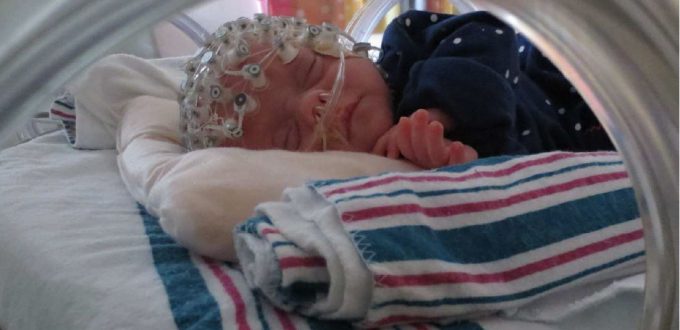Caring touch helps premature brains mature
17 March 2017

Every year 15 million preterm infants are born, and most spend their first weeks in neonatal intensive care units (NICUs). Although essential for the support and survival of these infants, the sensory environment of a NICU is dramatically different from the environment in which term-born infants mature, and thus impacts the development of functional brain organization. Amplifying the importance of this fact, early sensory development is the critical scaffold upon which healthy perceptual, behavioral and cognitive development depends.
In neonates, touch is a building block for interpersonal interactions and sensory-cognitive development. Many NICU treatments used to improve neuro-developmental outcomes rely heavily on touch. Yet, we understand little of how the brains of babies born prematurely and the quality of their early-life tactile experiences (e.g., supportive touch vs. painful tactile events) interact to shape ongoing brain development.
In a study published today in Current Biology, Dr. Nathalie Maitre and her colleagues show that the more preterm a baby is born, the more likely he/she is to have a smaller brain response to gentle touch when leaving the hospital to go home. However, the quality of the tactile experiences received while in the NICU was found to substantially alter the development of these brain responses. Thus, the more supportive touch preterm babies experience while still in the hospital, the more their brain responses to touch will be like those of term-born babies by the time they go home. In contrast, the more preterm babies experience painful procedures, the less their brain responses will be like those of term born babies, even when they receive pain medications.
This research is the product of international collaboration between Nationwide Children’s Hospital (Columbus, OH, USA), Vanderbilt University (Nashville, TN, USA), and the University of Lausanne (Switzerland) that is supported by the National Institutes of Health (USA), the Swiss National Science Foundation, the Pierre Mercier Foundation, and Carigest SA.
Dr. Nathalie Maitre, Associate Professor of Pediatrics at Nationwide Children’s Hospital led the study that started at Vanderbilt University, states, “Touch is a critical building block of infant learning. It helps babies learn how to move their body, how to discover the world around them and how to communicate with their family. Touch allows them to learn these skills even before they can see well, and certainly before they can talk”. Dr. Micah Murray, Professor of Radiology and Clinical Neurosciences at the University Hospital Center and University of Lausanne, explained the impetus for the study, adding; “Some people assumed that we could tell what babies feel, but most of our guesses were based on the responses of older children. Our team used cutting-edge electroencephalography methods to look at the activity of babies’ brains to see what they actually felt in response to gentle touch”.
Dr. Maitre and her colleagues did not want to assume that other signs such as facial expressions or vital signs could tell us how babies’ brain perceive touch. This is why they used a soft electroencephalography net and repeatedly measured the baby brain’s response to a soft puff of air. They did this in term born babies in the nursery and in preterm babies in the NICU, right before they were going home. Dr. Maitre emphasizes, “Making sure that preterm babies receive positive, supportive touch such as skin-to-skin care by parents is essential to help their brains respond to gentle touch in ways similar to those of term-born babies. Parents should know that every minute they hold their baby counts and helps baby brains and bodies grow. When parents cannot do this, hospitals may want to consider occupational and physical therapists to provide a carefully planned touch experience”.
Professor Wallace, a neuroscientist and Dean of the Graduate School at Vanderbilt University points out that the Current Biology study builds on work by other scientists researching infant pain, confirming that “It is absolutely essential to minimize the exposure to painful procedures that infants can often experience during hospitalizations”. Giving painkillers or sucrose does not necessarily counteract the damage that painful experiences can have on the baby brain; these agents may only hide the obvious signs of pain. Instead, until new research can prove which medications work at preventing changes in baby brain function, we need to focus on effective non-pharmacological alternatives to pain management.
The team is now designing new ways to provide positive touch in the NICU and investigating how a baby’s brain response to touch is altered in the presence of a voice, such as the soothing sounds of the mother. This line of research focused on the interactions between the senses will tell them about how babies build their ability to communicate and understand the signals provided to them in the first few months after birth, such as those from touch, hearing and vision. By understanding how the baby brain functions in response to sensory signals, Maitre and colleagues will work with parents to design new treatments for those children who suffer from brain insults or developmental challenges.
Author : CHUV
Reference:
Maitre NL, Key AP, Chorna O, Slaughter JC, Matusz PJ, Wallace MT*, Murray MM*;
The dual nature of early-life experience on somatosensory processing in the human infant brain.
Current Biology 27(7):1048-1054, Apr 2017. doi: 10.1016/j.cub.2017.02.036 >
